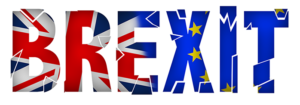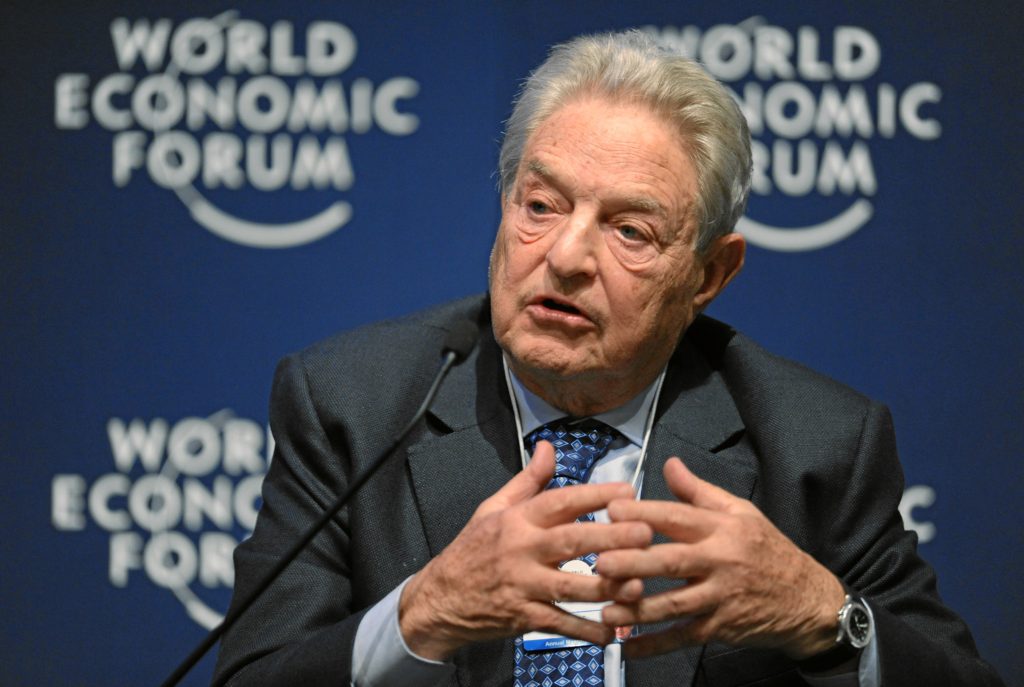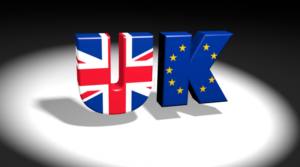15 February 2018
Soros and the EU
Brexit Democracy
by Lynda Goetz
 It would seem that Brexit discussions, like many political discussions, are extremely tricky. Positions are polarised and even though a majority voted to leave, it was hardly overwhelming. Roughly speaking, half the country voted to stay in and the other half voted to get out. Over a year and a half later, I suspect little has changed. Some who voted Leave may well be regretting it, having watched the omnishambles which has resulted; some who voted Remain have quite possibly changed their minds, having seen the undemocratic bullying to which this country has been subjected by the bureaucrats in charge of the EU negotiating team. On balance, however, it is highly likely that a second referendum would produce pretty much the same result: a roughly 50:50 split. Should that split tip in favour of Remain, how would that result be more democratic than the current one?
It would seem that Brexit discussions, like many political discussions, are extremely tricky. Positions are polarised and even though a majority voted to leave, it was hardly overwhelming. Roughly speaking, half the country voted to stay in and the other half voted to get out. Over a year and a half later, I suspect little has changed. Some who voted Leave may well be regretting it, having watched the omnishambles which has resulted; some who voted Remain have quite possibly changed their minds, having seen the undemocratic bullying to which this country has been subjected by the bureaucrats in charge of the EU negotiating team. On balance, however, it is highly likely that a second referendum would produce pretty much the same result: a roughly 50:50 split. Should that split tip in favour of Remain, how would that result be more democratic than the current one?

Whatever one’s feeling on this subject, it is really hard to believe that a billionaire throwing his money behind an attempt to force a second referendum, if necessary by bringing down a legitimate government, could be anyone’s idea of a way forward. George Soros (now aged 87) and one of the world’s most successful investors and greatest philanthropists, may have a house in Chelsea, but he is not even a British citizen. He is a Hungarian who, after getting his first chances in life here, has chosen American citizenship. He still loves this country, apparently. He also claims to be a great believer in democracy, although this does not appear to stop him throwing money about to change democratic situations he does not like. Fraser Nelson, editor of the Spectator, called him to task in an article in The Telegraph last week (Backing the Wrong Side) which questions his current logic (it also prompted well over 245 opinionated mud-slinging comments online – and those were seemingly just the publishable ones). Soros’s Open Society Foundation is, according to its own mission statement, dedicated to building ‘vibrant and tolerant democracies whose governments are accountable and open to participation of all people’. Where, currently, in that description does he see the EU?
It is understandable that, having left Hungary in 1947 (then unofficially dominated by Soviet Russia; later in 1955 to become part of the Warsaw Pact) at the age of 17, he later felt constrained to use his ample wealth to assist those countries trying to break away from the Soviet Bloc. As Fraser Nelson pointed out, he saw the EU ‘as the surest way of helping post-Soviet countries’. However, as the EU has become increasingly federalist there have been nationalist backlashes against it, which Soros has denounced – leading him in turn to receive a great deal of (frequently anti-Semitic) abuse from all sides. One does however have to wonder how exactly he views democracy. Perhaps his is an American view of democracy; not only one that is federalist, but one where it is acceptable for outsiders to muscle in and interfere (whether they be American Presidents who tell us that we will go to the ‘back of the queue’ for trade deals if we leave the EU or Russians attempting to influence American elections).
 It is this very federalism which led many of those who voted for Brexit to seek our departure from an institution which, when we joined it back in 1972, was the European Economic Community. We were not party to the long-term ambitions (although it is almost certainly fair to say that our political masters were) of the federalists; and it is that which caused so many of us to vote Leave. That vote was not one made in ignorance (in spite of the patronising views of many Remainers), but one made with a very clear eye on the fact that the EU increasingly seeks to become the United States of Europe. M. Juncker denied this categorically (No Superstate ambitions), in a press conference yesterday, but the evidence appears to be against him. Some, including possibly, George Soros, may consider that to attempt to create a huge democracy along American lines out of a disparate and very different group of European countries is fine. He may even think that ‘the end justifies the means’ and that in order to attain that State it is permissible to use all and any methods at his disposal. However, the step from this to dictatorship for the ‘good of the people’ is a very short one. Anyone who has given some thought to the future (and indeed for those who have not) and the connection between power and money plus the access to longevity (or indeed immortality) for the wealthy may wish to view a new American Netflix series based on British writer Richard K.Morgan’s novel of the same name. ‘Altered Carbon‘ shows us an extremely entertaining, albeit pretty scary, vision. In this ‘human’ world, money can buy a great deal more than democracy.
It is this very federalism which led many of those who voted for Brexit to seek our departure from an institution which, when we joined it back in 1972, was the European Economic Community. We were not party to the long-term ambitions (although it is almost certainly fair to say that our political masters were) of the federalists; and it is that which caused so many of us to vote Leave. That vote was not one made in ignorance (in spite of the patronising views of many Remainers), but one made with a very clear eye on the fact that the EU increasingly seeks to become the United States of Europe. M. Juncker denied this categorically (No Superstate ambitions), in a press conference yesterday, but the evidence appears to be against him. Some, including possibly, George Soros, may consider that to attempt to create a huge democracy along American lines out of a disparate and very different group of European countries is fine. He may even think that ‘the end justifies the means’ and that in order to attain that State it is permissible to use all and any methods at his disposal. However, the step from this to dictatorship for the ‘good of the people’ is a very short one. Anyone who has given some thought to the future (and indeed for those who have not) and the connection between power and money plus the access to longevity (or indeed immortality) for the wealthy may wish to view a new American Netflix series based on British writer Richard K.Morgan’s novel of the same name. ‘Altered Carbon‘ shows us an extremely entertaining, albeit pretty scary, vision. In this ‘human’ world, money can buy a great deal more than democracy.
I heard someone on the radio the other day say, effectively, that many Remainers have an almost ‘spiritual reverence’ for Europe. Wonderful. Europe however is not the European Union. Although an island, we will remain part of Europe once we have left the European Union. Geographically, culturally and historically we are and will continue to be linked. An interesting article written by former Chancellor of the Exchequer, Lord Lawson, before the referendum back in May 2016 makes this point clearly and succinctly, as well as the point that what the Leavers wanted was ‘a genuinely global future as a self-governing democracy’. Most of us are not ‘little Englanders’. Many have lived abroad; speak one or more other languages and welcome the chance for others to visit and to live and work amongst us here. The ability to continue our close historic and cultural ties with the rest of Europe should not disappear once we have left the European Union. People from this country have long travelled to Europe (although historically it tended to be the wealthier classes who were able to do so) and indeed fought in Europe. People like George Soros came here frequently supported or sponsored by Brits. In a global multicultural world it will not be possible or even desirable to stop these exchanges, but we should, as a self-governing democracy be able to be in charge of them ourselves – not subject to diktats from Brussels. If Brussels has its way though, threats of the sort uttered last week by M. Barnier over the issue of the transition period would almost certainly be reiterated should we ever put ourselves in the position of crawling back to the EU. They wish to punish us for leaving. Just how easy would it be for those ‘punishments’ to be even worse were we to beg to be let back in, re-join, or simply never leave, should those supported by George Soros and others get their way?
As Boris Johnson said in his major speech given in London yesterday (14th February – we love you Europe), we need to unite around the Brexit vision. Sadly, there has been very little vision to unite around and, given the polarised views still held, I fear that harmony is unlikely to break out any time soon. A lot more positivity, as well as some positive leadership, would nevertheless be very welcome. Sometime very soon, please?


